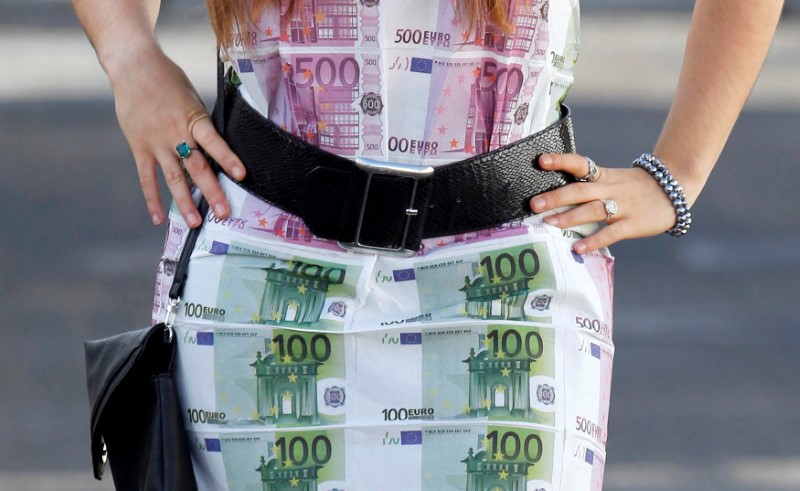By Saikat Chatterjee
LONDON (Reuters) - The euro is the year's best-performing major currency against the dollar, but a shrinking interest-rate advantage and the weight of the bets on the single currency are making a retreat ever more likely.
The euro reached its highest point since January 2015 on Thursday at $1.1777, with a variety of factors contributing.
Chief among them were increasing talk the European Central Bank will soon begin to wind down its bond-buying stimulus and the dollar's decline to 13-month lows against a basket of other major currencies (DXY).
Political calm after elections in the first half of the year and improving economic data in the euro zone also helped. Greece's successful debt sale this week - its first in three years - was a sign of confidence in the euro.
European Central Bank chief Mario Draghi provided the single biggest boost in June, when he gave a speech in Sintra, Portugal, that many took to mean the ECB was getting closer to ending its bond-buying program. The euro rose nearly 5 percent against the dollar.
"It is as if the markets are almost impatient with the ECB to tighten policy as soon as possible without giving a thought to the speed of the underlying (euro) move," said David Kohl, chief currency strategist at Julius Baer in Frankfurt. "They may be in for some disappointment."
The single currency has gained nearly 11 percent against the dollar so far in 2017. At the same time, long euro positions - bets it will rise - have increased to the largest number in six years, according to Commodity Futures Trading Commission data.
Now some analysts say things have moved too far, too fast.
"The currency markets are getting a bit ahead of themselves on the euro premium story," said Adam Cole, head of G10 FX strategy at RBC Capital Markets in London. He recommends selling the currency against the likes of the Australian dollar (EURAUD=D3).
Any sudden weakness will have implications for investment flows in both equity and bond markets, where currency gains have boosted returns.
Unhedged equity flows in the second quarter of the year have been a big factor behind the euro's strength, according to Morgan Stanley (NYSE:MS) strategists, and any weakness in the currency would trigger outflows, at a time when European stocks have been underperforming their U.S. counterparts.
Warning noises are the loudest from bond markets. The yield premium offered by lower-rated euro zone states has shrunk, nearing two-year lows. That reduces the return investors can earn from borrowing in low-yielding currencies such as the Swiss franc
Equally worrying, spreads between U.S. and German debt have widened, making it more attractive for European institutional investors to buy U.S. debt, if the dollar stabilizes.
At 203 basis points, the two-year U.S. yield premium over German debt is near its highest in more than a month, and the 10-year premium of 177 bps is at its widest in two weeks.
"If the premium continues to trend in the U.S. favor, the dollar may get better traction," said Marc Chandler, global head of currency strategy at Brown Brothers Harriman in New York.
WARNING SIGNS
The euro is also coming up against key resistance levels on charts that can contribute to investment decisions.
It is holding around $1.17, a 23.6 percent retracement of the 2008-2017 $1.6040-$1.0340 range on the monthly charts.
Beyond that is the psychologically important level of $1.20, where the euro last traded in January 2015.
Some other indicators say the euro is not yet overbought, but amber signals are flashing from the currency derivatives markets.
Risk reversals for the euro
And then there is history. Ben Bernanke, then the Federal Reserve Chairman, caused a "taper tantrum" when he signaled in May 2013 it was time to stop pumping cash into the U.S. economy. The dollar index (DXY) fell more than 3 percent by September before Bernanke backpedalled on the timing.
By that metric, the euro has already outperformed the dollar.
Not everyone sees the euro falling. It remains somewhat undervalued on a trade-weighted basis compared with its longer-term averages and economic prospects remain bright.
For Kevin O'Nolan, a multi-asset fund manager at Fidelity International in London, "the game changer for the euro this year has been the politics".
He is looking to play euro strength by buying it particularly against the Korean won
Graphic:
Graphic:

Graphic: